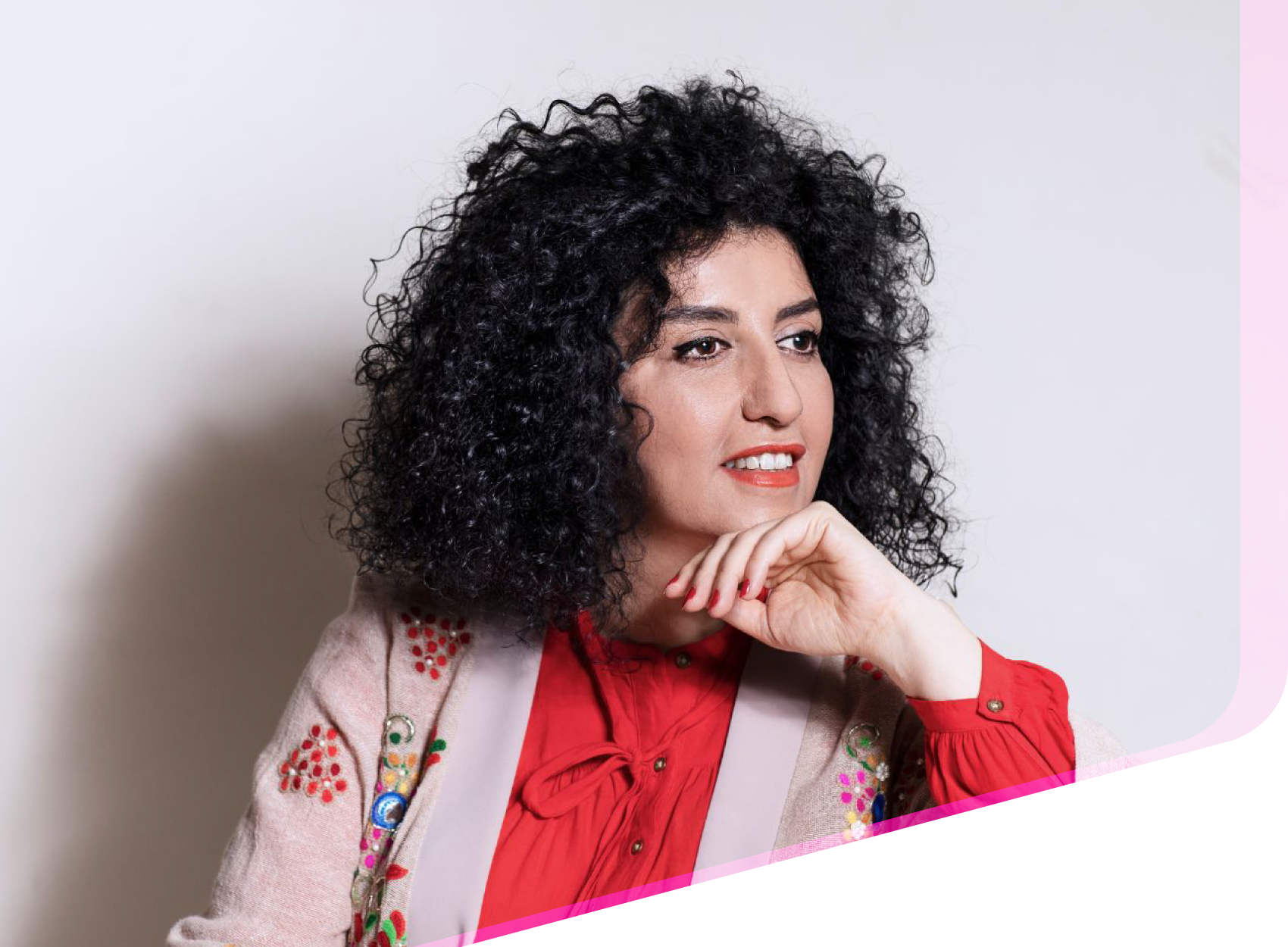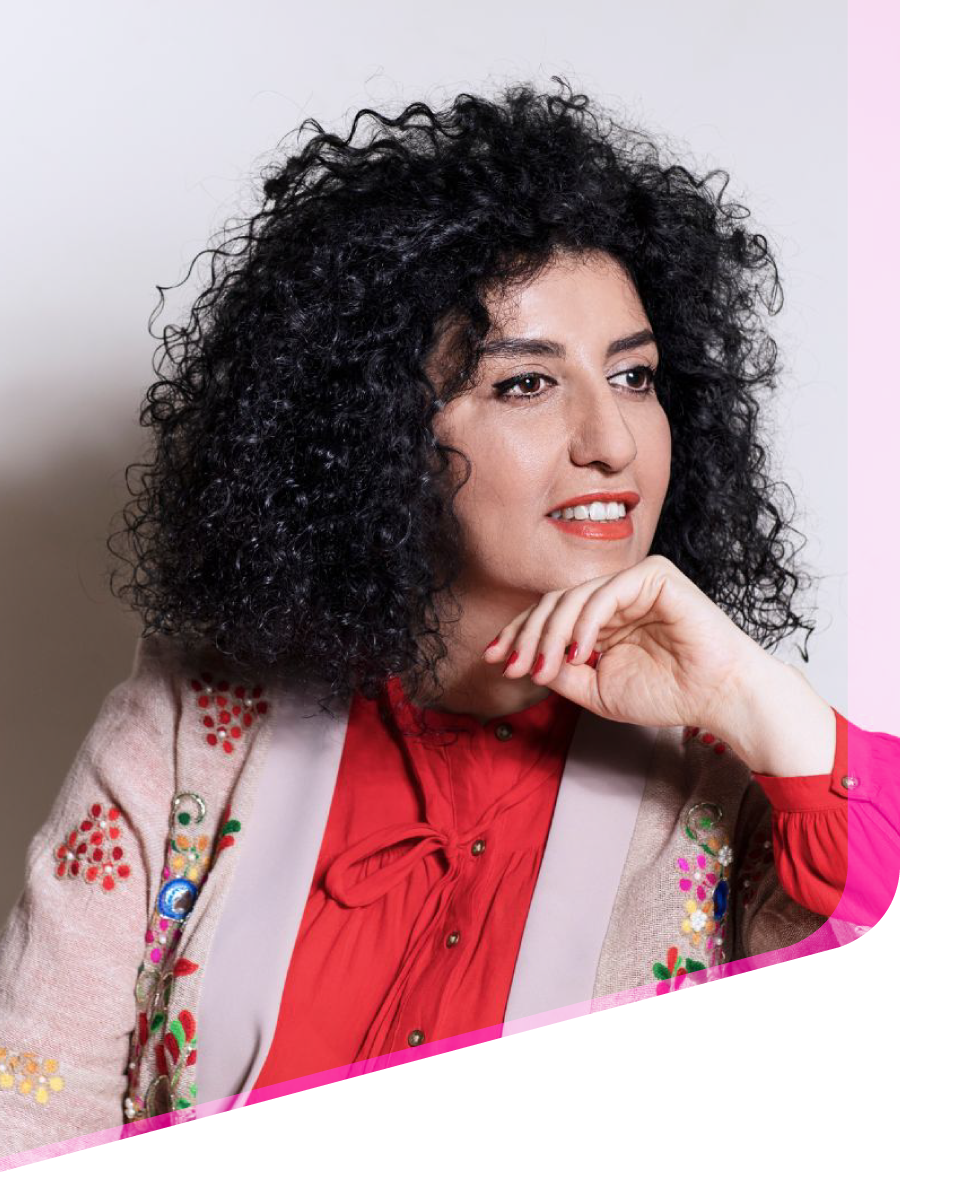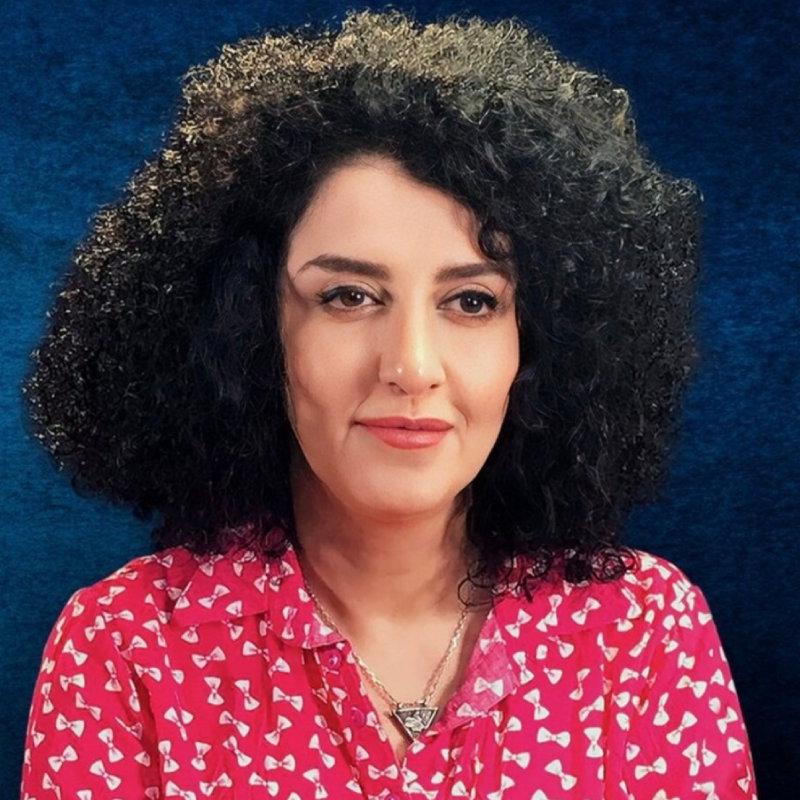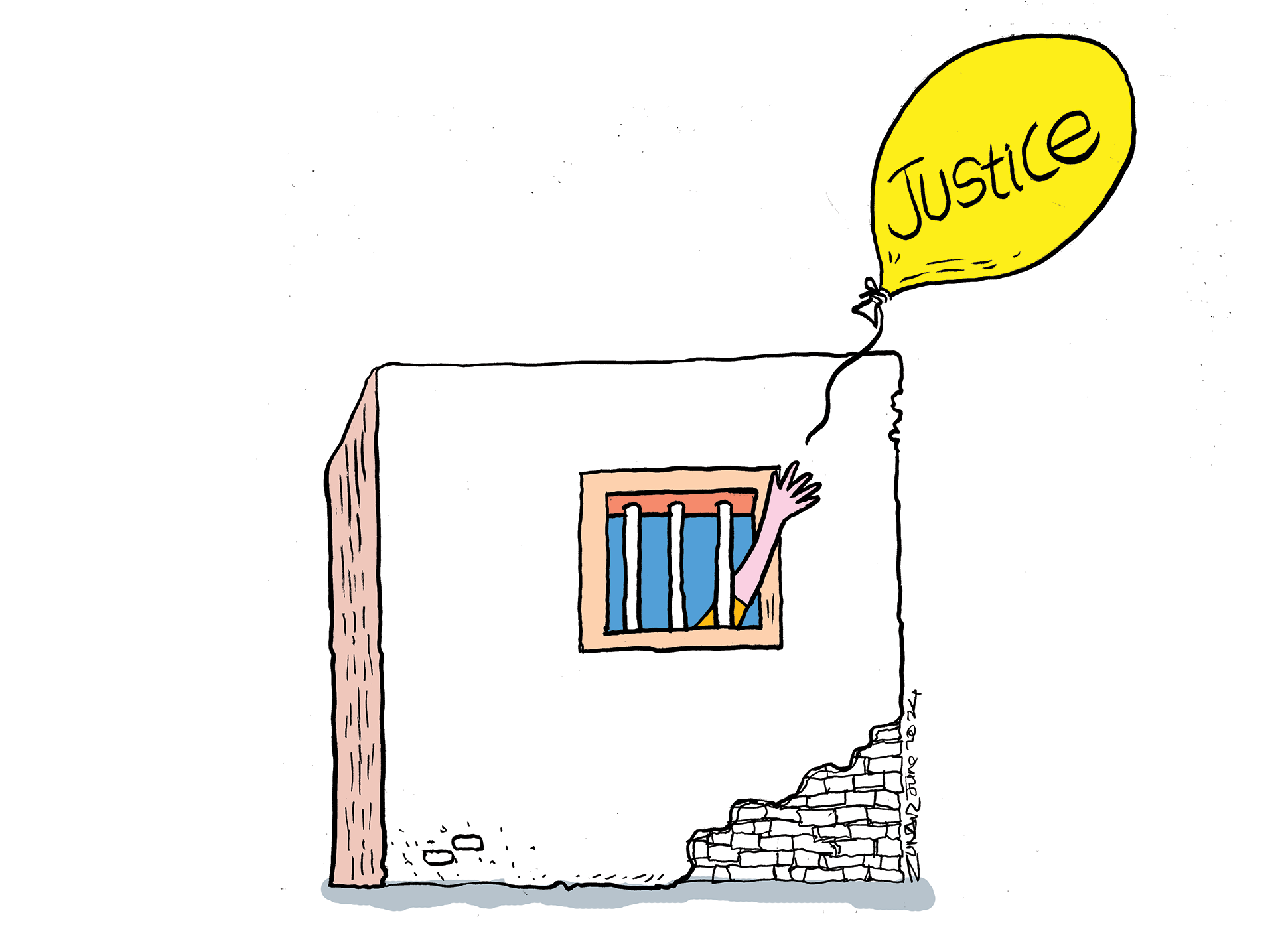
Iran
Iran
Iran
Narges Mohammadi
Narges Mohammadi
Narges Mohammadi
2023 Nobel Peace Prize Laureate
2023 Nobel Peace Prize Laureate
2023 Nobel Peace Prize Laureate

Iran
Narges Mohammadi
2023 Nobel Peace Prize Laureate
“I call on supporters of democracy worldwide to rise and create a global force.”

VITA
Narges Mohammadi is a 2023 Nobel Peace Prize Laureate, women's rights, and pro-democracy activist from Iran. She studied applied physics at the International University in Qazvin. As a student, she co-founded the independent student organization “Roshangaran,” leading to her arrest twice due to her opposition to the government. Starting her journalism career in 1996, she wrote about students and women’s movements, eventually joining the journalists' union. She also co-founded several independent organizations. Despite losing her job due to her activism, she worked as an engineering inspector for nearly 10 years before being fired by an order from the Ministry of Information. Her human rights activities led to multiple arrests, solitary confinement, and a cumulative prison sentence exceeding 32 years. She established several human rights institutions, including the Women’s Citizenship Center and “Abolishing Death Penalty Step by Step.” In 2023, she was awarded the Nobel Peace Prize for her fight for women’s and human rights, with her twins, Ali and Kiana, accepting the prize on her behalf as she remains in prison.
How are you these days?
Since being forced to stay in prison for many years, life in here has become my lifestyle. I tried to create a lifestyle for myself that allows me to continue my resistance and struggle. It is a hard endeavor because the government has limited my humanity, femininity, and motherhood from all sides. But I strive not to let the government place me in the position of a victim. Resistance and struggle are my conscious and valuable life choices. With such a mindset, I must say that I live in Evin Prison. Since 29 November, fifty days after receiving the Nobel Peace Prize, my phone calls and visits have been cut off. In March this year, I lost my father, and the government has not allowed me to even offer condolences to my family in Iran. I have not heard my children's voices for years. On 20 May, I was tried on charges of propaganda against the government, accused of revealing and claiming that government men have assaulted and detained protesting women. This is my sixth trial in my last three years of imprisonment. I have not recognized or attended any of the court’s proceedings, nor defended myself, but received prison sentences.
Your fight to promote democracy and women's rights in Iran never stopped, even after your imprisonment. What inspires you to embark on this journey?
I am a woman in the Middle East who has lived under a despotic and misogynistic religious government. This has driven me to oppose the current state of affairs. When I speak from the position of an Iranian woman, undoubtedly Iranian women have the most precise understanding of the situation. As I spent my childhood during the worst decades of repression, I experienced the severest violations of human rights and women's rights. My lessons from the history of the Iranian people's struggles, my understanding of the critical junctures in my country's history, and my belief in the growth of public awareness have led me to continue my struggle. My passion for freedom, equality, and democracy is not merely due to the oppression and violation of my human rights, but more so because of the horrific and pitiable situation of millions of Iranian men and women.
With the death of Mahsa Amini followed by nationwide protests, the government has silenced dozens of dissidents and pro-democracy activists. What has been the most difficult moment for you?
The ongoing events in the streets show that the government is unable to neutralize and silence the protesters and dissidents. Although it has managed to prevent nationwide protests, we see that women, through powerful civil disobedience, have challenged the government. These days, we witness brutal confrontations and beatings by government agents against women in the streets. This intensity of clashes and violence indicates the strength of resistance and the presence of protesters, which I call the "authority of the protesters." However, what is unbearable for me is the harsh reality that the government, in the name of religious values and orders, has plundered the lives of women through the enforcement of compulsory hijab, dress codes, and social, cultural, and even economic restrictions. Now, it is shamelessly and brazenly committing sexual assaults and harassment against protesting women in various forms to force them to silence. I will stand against the religious rulers to turn sexual assault into another tool for oppressing women, even if I am tried and sentenced for the tenth time. What happened to Nika Shakarami is a glimpse of the sexual savagery of the men of the religious government that will never be forgotten.

In post-2003, you led a national campaign against the death penalty. How do you evaluate the situation for women in Iran who stand for their rights but are silenced by the death penalty?
The government's approach to dealing with popular protests is ruthless and violent suppression. Elections in Iran no longer hold the meaning they do in the democratic world. The legitimacy of the regime is collapsing day by day. You are witnessing the death sentence of Toomaj Salehi and the eight-year prison sentence of the prominent Iranian director Mohammad Rasoulof. In such a situation, the government uses all tools of repression against women, such as threats, torture, arrests, imprisonment, street killings, executions, sexual assault and harassment, etc. Despite all of this, the world is witnessing the daily occurrence of various civil and sectoral protests on the streets and in front of government offices, with women becoming bolder and more resilient in their civil disobedience than before. Although execution remains a ruthless and worrying tool used by the government against protesters, it will certainly not prevent the continuation of protests and uprisings in the not-so-distant future in Iran.
Could you tell us why the Iranian regime suppresses its own mothers, sisters, and daughters?
Following the killing of Mahsa-Jina Amini and during the nineteen months since the "Woman, Life, Freedom" movement, I have become familiar with the stories of women who have been members of the families of government agents, especially the Islamic Revolutionary Guard Corps. However, the regime does not regard us, the dissenters and protesters, as their own mothers, sisters, or daughters. To maintain its hollow power, it resorts to any inhumane actions, even against its own daughters, women, sisters, and mothers.
How can international solidarity play a role in addressing these challenges?
In my opinion, human rights and women's rights in the Middle East, especially in countries under religious, despotic, and archaic regimes like the Taliban and the Islamic Republic, are not prioritized in the policies of Western governments. Many policies and major decisions are made based on economic interests. The world should rest assured that we, the people of Iran, will not back down in our pursuit of democracy and human rights. In this confrontation, time will reveal how democracy advocates around the world will use their powerful means to support democracy in Iran. The most urgent action needed is to criminalize gender apartheid at the United Nations level and address the crimes of despotic religious regimes against women. Women must be considered both from a human rights perspective and practically, as their potential and capacity are crucial for achieving democracy in countries like Iran. Criminalizing gender apartheid and abolishing the death penalty in Iran require international cohesion.
What is your message to pro-democracies around the world?
The people of Iran have expressed their will for democracy, freedom, and equality, and this movement is unstoppable and relentless. We demand an end to a misogynistic religious dictatorship that has endangered lives, and normalized lies, deception, and corruption. The Iranian people's movement is about fundamentally changing life, and this will not be achieved except through the realization of democracy alongside equality and freedom. I call on supporters of democracy worldwide to rise and create a global force. Let's not be indifferent to ending wars anywhere on this planet, whether it's in Ukraine or elsewhere. Let's not be passive in ending despotic regimes like the Islamic Republic and the Taliban.
Iran
